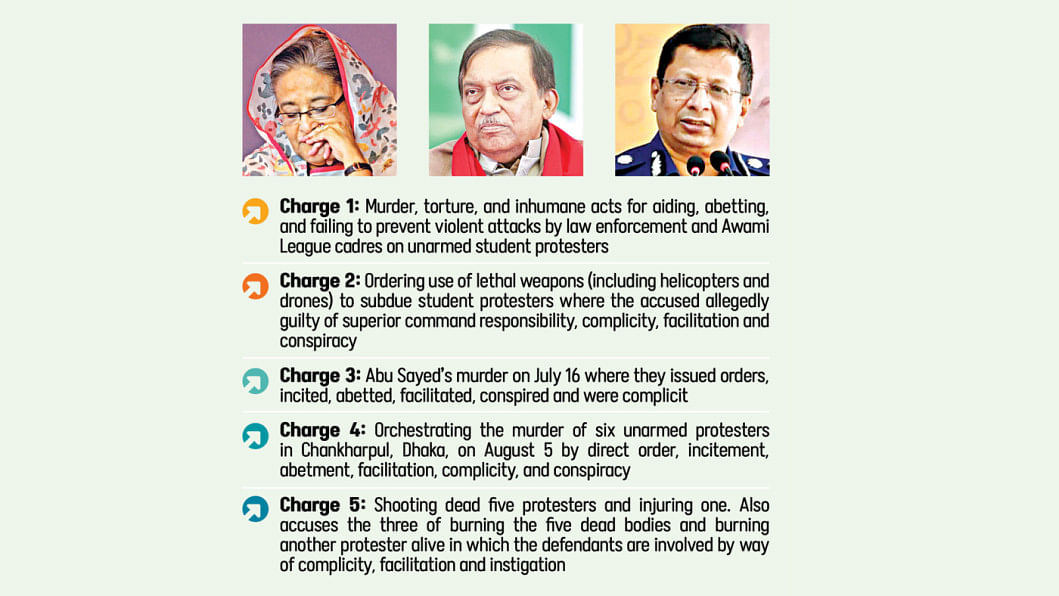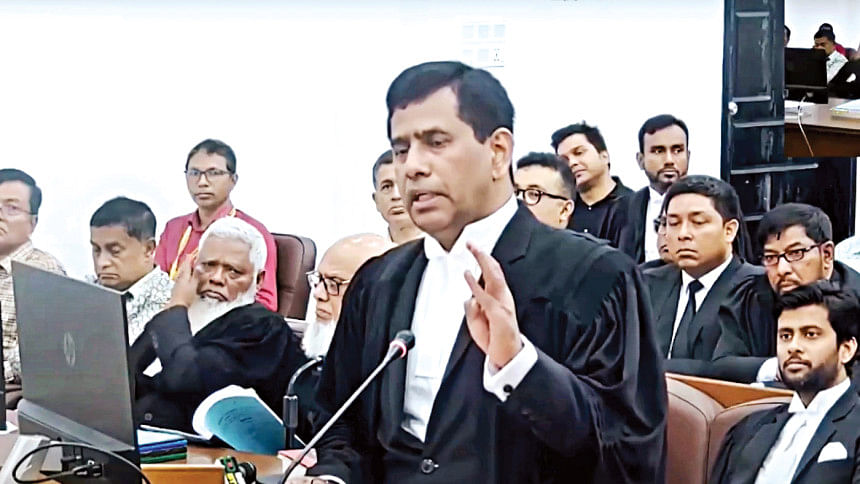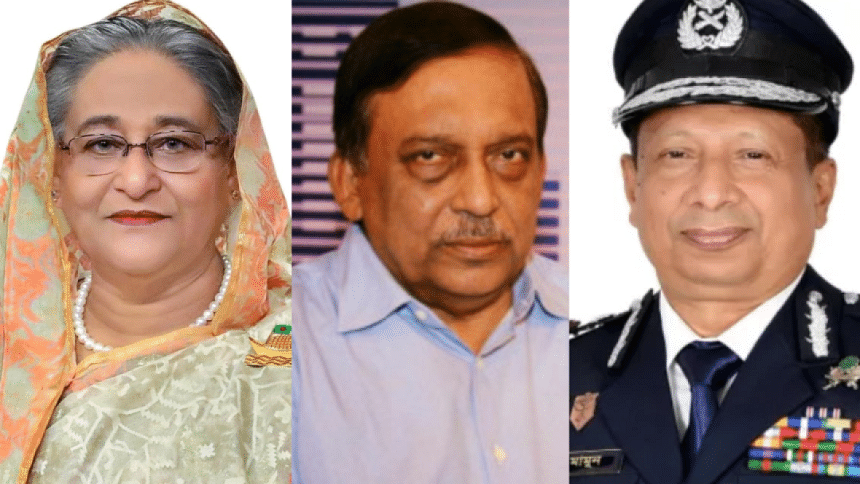July atrocities: Hasina charged with crimes against humanity
Almost 10 months after the fall of her regime, Sheikh Hasina and two of her top aides were charged with five counts of crimes against humanity yesterday.
The prosecution of the International Crimes Tribunal-1 pressed formal charges against the deposed prime minister, former home minister Asaduzzaman Khan Kamal and former top cop Chowdhury Abdullah Al-Mamun, for murder, attempted murder, torture, and use of lethal weapons, among others.
The tribunal took cognisance of the charges and set June 16 as the next date for hearing, ordering that the trio be produced before it. While the ex-police chief, Mamun, is in custody, Hasina and Kamal are absconding.

The charges state that the three were involved in crimes against humanity because of their superior command responsibility, conspiracy, incitement, instigation, facilitation, abetment, complicity, failure to punish, and failure to prevent crimes.
This is the second case of crimes against humanity relating to the July uprising at the tribunal, originally set up in 2010 to try the 1971 war crimes.
The prosecutors produced 8,747 pages of documents and testimonies from 81 witnesses along with 135 pages detailing the formal charges.
The charges state that 1,500 people were killed and 25,000 others wounded during the protests in July and August last year when the law enforcers expended 3,00,011 rounds of ammunition.
Evidence also includes drone and CCTV footage, audio clips of telephone conversations, forensic reports of digital evidence, confessional statements, photographs and videos on social media and news outlets, reports from national and international organisations, and official documents from state agencies.
Audio clips include two phone conversations from July 16 and July 18 between Hasina and former Dhaka South mayor Fazle Noor Taposh, and another between Hasina and former Dhaka University vice chancellor Maksud Kamal in which Hasina said she had instructed the use of lethal weapons to kill the protesters, according to evidence submitted to the court.
This case began with a complaint to the investigation agency on August 14 last year against Hasina. The first investigation officer, Jane Alam Khan, was later replaced by Alamgir Hossain who submitted the probe report on May 12.
Amid tight security, the tribunal judges walked into a packed courtroom at 12:10pm. For the first time in the country, the proceeding was broadcast live on TV.
There was a bit of anxiety as well, since two crude bombs went off at 5:50am outside the court. The police recovered a third bomb that did not go off.

THE CHARGES
Count 1 accuses the defendants of murder, attempted murder, torture, and other inhumane acts. They are accused of abetting, inciting, facilitating, being complicit in, and failing to prevent these crimes committed against civilians by law enforcement and armed cadres of the Awami League and its affiliates.
This count specifies that following Hasina’s July 14 press briefing, former home minister Asaduzzaman, former IGP Mamun, and other high officials of the then government abetted, assisted, and were complicit in the severe and systematic attack on innocent, unarmed students and masses.
In count 2, Hasina is accused of ordering the use of drones and helicopters along with lethal weapons to subdue protesters. The prosecution charged Asaduzzaman and Mamun with facilitating and executing this directive by instructing law enforcers.
This count charges the defendants with ordering, facilitating, being complicit in, and conspiring to commit crimes against humanity, knowingly and systematically.
Count 3 accuses the defendants in the murder of Abu Sayed, a student of Begum Rokeya University in Rangpur.
Hasina is accused of making inflammatory remarks and ordering the use of deadly weapons against protesting students.
The two other defendants then, along with senior government officials, allegedly instigated, aided, and were complicit in the actions of their subordinate law enforcement personnel and armed Awami League cadres.
As part of the widespread and systematic attack on unarmed student protesters, on July 16, police shot Sayed several times without provocation. The defendants ordered, incited, abetted, facilitated, were complicit and conspired to commit crimes against humanity.
Count 4 accuses the defendants over the shooting and killing of six unarmed protesters in Dhaka’s Chankharpul on August 5 last year.
The charges accuse Hasina of making inflammatory remarks and ordering the use of deadly weapons against student protesters. In response, the former home minister and former IGP, along with other senior government officials at the time, allegedly instigated, aided, and were complicit in the actions carried out by their subordinate law enforcement personnel and armed Awami League cadres.
The prosecutors said the atrocities in Chankharpul were carried out on the defendants’ orders, and with incitement, abetment, facilitation, complicity, and conspiracy, constituting crimes against humanity.
In count 5, the defendants are accused in the shooting of six student protesters, five of whom were killed and burned, while the sixth was reportedly set on fire while still alive, in Ashulia on August 5 last year.
Hasina is accused of making inflammatory remarks and ordering the use of deadly weapons against student protesters. Following this directive, the defendants, along with other senior government officials at the time, allegedly instigated, facilitated, and were complicit in the actions carried out by their subordinate law enforcement personnel and armed Awami League cadres.
The prosecution said that this was carried out knowingly with the defendants’ orders, incitement, abetment, facilitation, complicity, and conspiracy, constituting crimes against humanity, including other inhumane acts such as torture and murder.
‘SYSTEMATIC ATROCITIES’
In his opening presentation before the tribunal, Chief Prosecutor Tajul Islam described the July–August 2024 atrocities in Bangladesh as a “blood-soaked chapter of history” that left the nation and the world stunned.
He accused the defendants of unleashing the state machinery to commit widespread, systematic atrocities — murders, torture, and enforced disappearances.
Tajul said the uprising, dubbed “Monsoon Revolution”, arose from years of political repression and human rights abuses. He said the accused, alongside state forces and political affiliates of the AL, coordinated an extermination campaign across the country.
“This trial is not merely a domestic issue of Bangladesh. The crimes against humanity committed in July-August 2024 are also prosecutable under International Human Rights Law, the Rome Statute of the ICC, and the International Crimes (Tribunals) Act of 1973 of Bangladesh,” he said.
Paying tribute to the victims of the July uprising, Tajul said, “This trial is not a pursuit of vengeance.
“We aim to prove that in a civilised society, where democracy and the rule of law prevail, genocide and crimes against humanity cannot be tolerated. In a country where justice exists, no one can stand above the law, no one will be above the law.”
He also said, “We seek a trial that is impartial, evidence-based, and grounded in justice.”
Two other prosecutors, Mizanul Islam and Abdus Sobhan Tarafdar, also read out parts of the formal charges that provided the historical background spanning five decades and added context to the trial, while Tajul read out the charges and took the opportunity to stress that Awami League, its affiliates and alliance partners were involved in these crimes. He said this was sufficient cause to recognise them as criminal organisations.
LondonGBDESK//



Comments are closed.